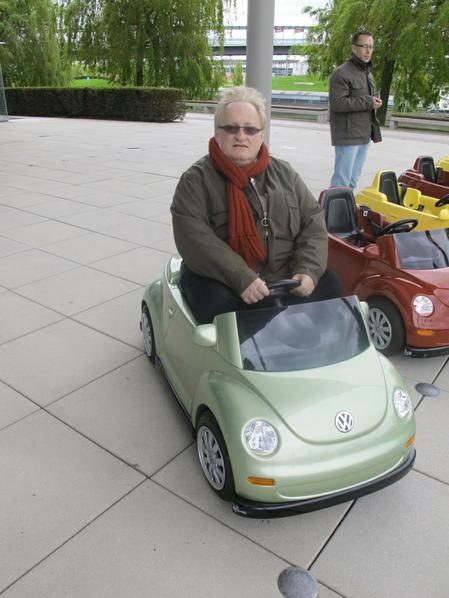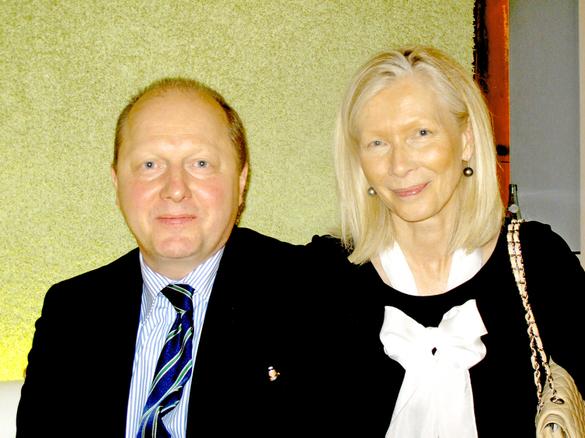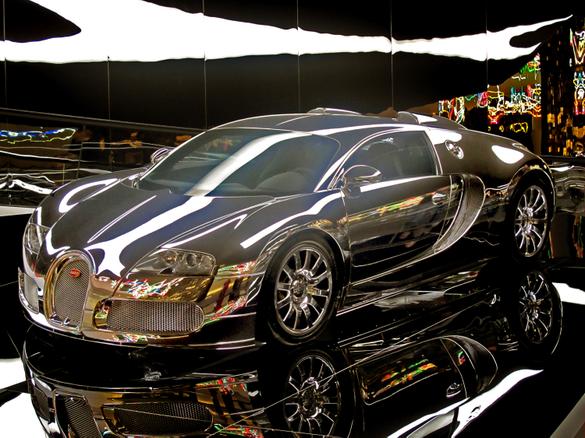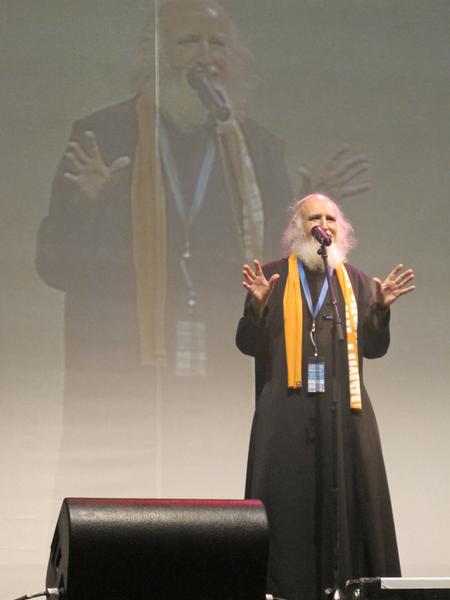I Sleep in Hitler's Room (8 page)
Read I Sleep in Hitler's Room Online
Authors: Tuvia Tenenbom

No. Not one of them smile at me because of some booklet. They smile at me because I am a natural Smile Maker. You just see me, look at me, and you love me.
Yeah!
I enter my glitzy room and I’m immediately welcomed by a big TV that begs to spoil me. Erotic films are here for me, if I want. On the screen is this sexy young lady, lying so suggestively, and smiling at me. Even TV ladies love me! Such a good feeling! The Ritz is also happy to allow me to use a bathrobe for my pleasure, free of charge. I can also buy this robe, if I want, for only 128 euros. A
steal. Maybe I’ll buy it, but later. I say good-bye to my Lover Lady on the screen and go out. I’ll come back, Lover. I will see Autostadt and then come back. Will you wait for me, Love?
Autostadt, a German Disney, is plain gorgeous. Everything is glitzy, shiny, and you can’t smoke on the street. VW cares about people, and smoking is bad for the health. Gas is good, but smoking is bad.

Angelique, one of the employees, takes me on a privately guided tour of the car-delivery system at Autostadt. Obviously many German clients elect to come here and pick out their car at the source.
First she shows me to the two glass silos, shining towers that house the Volkswagens delivered on location. Already today, 690 cars were delivered. It’s a marvel to watch. A forklift picks the car from the belly of the silo, as you watch, to be handed to you in just a bit. It’s like the delivery of a baby, the silo being the womb.
There’s a whole spiel to follow. When you actually get your car, VW agents come by equipped with cameras. They take pictures of you, and whoever is with you, standing next to the new car. This picture-taking ceremony reminds me of a wedding. The buyer and the car, in sickness and in health.
What VW has done here is wonderful: creating a community of great shoppers, of lovable followers.
Don’t laugh at me. It really works. Say what you want, this is definitely a love affair. Between the German buyer and his car.
Here’s a family who drove 500 km to get their car at Autostadt.
They are very happy they came all the way up here. It’s a special experience. They will even stay at the Ritz an extra day. Just decided. But “the wife is better than the car,” says the hubby. “She is softer.”
I’m starting to understand—starting!—what Unwilling Capitalism is all about. Maybe I’ll convert. Won’t you?
There’s a wonderful proclamation on the wall in the Audi Pavilion:
To us,
Vorsprung
[leading] is an inner drive. The innermost drive.
Vorsprung
is in our genes.
Vorsprung durch Technik
[leading through technology] . . . this is where superiority comes to bear.
It’s
Vorsprung
. I like it much. I want to be German. Tuvia Schmidt.
On the first floor of Volkswagen GroupForum you can see the Level Green exhibition. it’s something about how people of next generations will have a good life, provided we do our part. VW is here to show us how.
Another exhibition nearby is about irrigation and how to save water.
Next to every exhibition there’s a well-dressed person, an employee whose job it is to explain to you all kinds of good things. I like the way they look: like they just came out of the shower. For us.
I’m surrounded by love.
I have a chat with one of these employees, René. “Volkswagen recognizes its responsibility for the world,” he says to me, and that’s why they expend human resources on water shortages across our planet.
The Jewish Irritating Voice in me shouts into my ears, There are two possibilities here: 1) The people who come here don’t believe a word this René says, and 2) they believe him. If possibility no. 1 is correct, then VW must be the laughingstock of Germany. It doesn’t look it. If possibility no. 2 is correct, the Germans are the most naïve of people on our planet.
Shut up, Irritating Voice! Listen to René, he’s talking to you! It takes 150 liters of water for one orange, René continues to share with me, and VW wants to find ways how to improve the system.
Will Volkswagen also build an exhibition on world peace? I ask him.
Oh, that’s difficult, says René. Oranges are easier. In Spain, for instance, they need only 15 liters of water per orange, because they concentrate the water just on the orange. Not in Africa, a very rich and corrupt place, which spends all its water . . .
The man goes on and on and on. Who taught him so much stuff?
Nothing here is about money, in case you wondered; it’s all about goodness. Really. I, Tuvia Schmidt, know. I can read a map. VW is run by people who care for human integrity and equality; it’s not really a car company, it’s a church. There are many nuns and pastors in this church, all of them selfish-less volunteers.

Above them all is Otto F. Wachs, CEO of Autostadt. We sit down to chat about the Autostadt Charitable Organization and Culture Corporation.
He’s fifteen years on the job and personally he drives a “very fast Audi.”
He explains to me, the slow-to-get-it American: “Our people, Germans, are very driven on technical elements. We might not be as good as you are in communications, as you are in Silicon Valley.”
I don’t know what comes over me suddenly, probably temporary insanity. My face gets very ugly, like the faces of those fat American journalists, and I say to him something very nasty: I tell him to drop the mask, that I don’t buy his employees’ comments that VW cares about people, and that all this Level Green business smells to me like one big hypocrisy. Will he challenge me on this?
I need a psychiatrist, no doubt. Otto looks at me and says:
“You want a very open answer? We are selling cars. You won’t believe how many cars we sell!”
Did he lose his mind as well? Is he saying what I hear him saying? Does he say that all those exhibitions are just a show?
“My purpose is to sell cars.”
Insanity is contagious, I can see.
VW, he tells me, produces more than six million cars a year. In America, he explains to me, a car is about going “from point A to B.” Not so in Germany. Most Germans buy cars because they like the product. “They are buying it not because they need it for the mobility factor, for going from A to B. Much different from your country.”
Mercedes-Benz, he is proud to share with me, is the inventor of cars, and this makes the Germans proud.
There are other differences between Americans and Europeans:
“I remember this
60 Minutes
piece, on CBS, with the priest saying, ‘My daughter was driven to death by this Audi in the garage, because my car accelerated by itself. I could do nothing, and I killed my own daughter.’
60 Minutes
, CBS.’ So, we are out of business. Now I have to say something, because I was very open with you. You are a very open, democratic society. But in your country . . . your public, your media . . . Sometimes it’s over-exhausting, how the media is reacting in your country.”
The German media, he obviously believes, won’t do this.
Good to know. If one day I get to own a car company and suddenly get bogged down with sudden acceleration problems, I’ll move to Germany in a blink of an eye.
Otto is in a good mood today. He keeps on talking, sharing with me the idea of it all:
“Once you leave Autostadt you believe in VW . . . and you’re more inclined to buy a VW.”

We talk for a long time and then he accompanies me out. He tells me that as long as I am with him I can smoke, that no one will stop me. I try it out. He’s right! I go back to the hotel. I’m tired. Doors open, smiles again. I get to my room. I can’t see my TV Lady. She must be very upset with me. I lie on the bed. Where am I going from here?
If I learned anything today it’s this:
Socialism is about making money while talking about the environment. Capitalism is about losing money during massive recalls.
Is this true? I don’t know anything anymore. Maybe I should go downstairs, take a chair with me, sit between doors, and have all those lovely ladies smile at me for hours.
I fall asleep dreaming of the Eternal Smiles by the Ritz-Carlton ladies and a big smile covers my face. Good to be a Ritz’er!
Chapter 7
Faith: Catholics and Protestants Looking to Eat “Body of Christ” Together, Jews Stay Up the Night Looking to Eat Other Things

In Munich, a bird whispers in my ears on the morning after, they have something called
Kirchentag
(an ecclesiastical congress or, literally, “church day”). The Catholics and the Protestants of Germany are making peace, or something like that. I wasn’t aware that there was a war, but what do I know? Not much; I’m just a tourist.
Thousands upon thousands of Germans are flocking to Munich; perhaps I should join. Following breakfast in the hotel I board the train south. I’m no Christian, but I’m fascinated with people who want to unite. I love unifications, it gives me a sense of warmth. Especially today do I need it. It’s cloudy and rainy and the Ash Cloud keeps on traveling around the skies of Europe. The
Bild-Zeitung
declares that this is the coldest summer in one hundred years. People are complaining but still have hope that the German team will win the WM (World Cup), which is of course very important. The DB, the German train system, issues a Fan Card. I get one. It’s cheaper for fans to travel in Germany. Twenty-five percent off for two months from today, and, every time the German team wins, I get another month of 25 percent off.
The streets of Munich are packed with praying people. I never knew there were so many religious people in Germany. Here’s a group praying for Afghanistan.
Across the street is another group praying to Maria. Or the other way around—I get confused. Regina, a nice lady from Lübeck, recommends a special prayer meeting that’s scheduled for tomorrow.
What’s that?
“We will find out on which side of Jesus we will sit in Heaven.”
Which side do you think you will sit on?
“I’ll find out tomorrow.”
I get excited. If I stick around long enough, I’ll get a nice place in heaven. Maybe, just maybe, I could take with me the smiling lady from my Ritz-Carlton TV screen. I don’t know if I should tell you, but I get a kick out of this whole heaven business. Regina of Lübeck will get Jesus, and I’ll get Ms. Ritz.